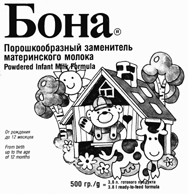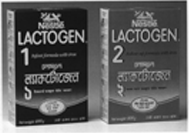| Take action to stop these violations of the International Code of Breast-milk Substitutes. The people responsible have names and addresses.
The tables below give details of some recent violations. The date when the violation was last reported to Baby Milk Action or confirmed to be current is given. The violation reference is for Baby Milk Action's records. Please quote it if forwarding correspondence to us, if possible.
August 1997
Nestlé offers a weak law to Russia
| Company |
Item
|
Date
|
Violation Reference
|
|
Nestlé
|
Attempts to undermine implementation of the International Code
|
1997
|
comp/97/06
|
Nestlé claims to support implementation of the International Code and it recently offered to help the Russian Government by providing a draft law. However, Nestlé's law was much weaker than the International Code and would have allowed Nestlé to advertise directly to mothers in hospitals.
Ask Nestlé to support implementation of the entire International Code in Russia as the "minimum requirement" in line with WHO policy.
|
Violation
|
Complain to
|
| World Health Assembly Resolution WHA34.22 calls for the International Code to be implemented in its entirety as a minimum requirement |
Mr. Peter Brabeck,
CEO Nestlé,
55, av. Nestlé,
1800 Vevey,
Switzerland. |
Nestlé's Bona sows the seeds of doubt
| Company |
Item
|
Date
|
Violation Reference
|
|
Nestlé
|
Bona infant formula packaging
|
June 1997
|
comp/97/07
|
 Bona Infant Formula is manufactured by Nestlé in Finland and marketed in Russia. Bona Infant Formula is manufactured by Nestlé in Finland and marketed in Russia.
Nestlé adds to the text of the Important Notice required by the International Code to undermine the message that breastfeeding is best for infants:
"Infant formula can be used from birth onwards when breastfeeding is not possible, or as a supplement to breastfeeding."
Supplementing breastfeeding interferes with lactation and makes an early end to breastfeeding more likely (the International Code Article 4.2 requires that educational materials inform mothers of this fact).
Having encouraged supplementary bottle feeding in the Important Notice, the feeding guide states that mothers should continue to use the formula "in the case of lack of breast milk."
Bona is the brand name for a range of Nestlé baby foods which a magazine promotion recently referred to as "best for my baby." Bona infant formula is promoted on the back of these other products.
|
Violation
|
Complain to
|
International Code 9.1 labels "should be designed...so as not to discourage breastfeeding
9.2 labels should "have not pictures or text which may idealize the use of infant formula.
Resolution 49.15 states that complementary foods should not be marketed in ways that undermine breastfeeding. |
Mr. Peter Brabeck,
CEO Nestlé,
55, av. Nestlé,
1800 Vevey,
Switzerland. |
SMA Nutrition offers 'prizes' to midwives
| Company |
Item
|
Date
|
Violation Reference
|
|
SMA (Wyeth)
|
Gifts to health workers
|
May 1997
|
comp/97/08
|
People attending the May conference of the Royal College of Midwives in the UK were offered gifts by baby milk manufacturers. SMA Nutrition encouraged midwives to seek out its reps by distributing a card with the message:
"Receive an immediate prize of: Clarins / Bodyshop / Toni & Guy vouchers if you find an SMA representative and give them this card."
"Complete the details on the back of the card and enter the prize draw to win a £100 House of Colour consultation."
To enter the prize draw the midwives were required to give details of mother classes held at their place of work and a work contact address and telephone number.
|
Violation
|
Complain to
|
International Code 7.3 bans financial or material inducements to promote products covered by the International Code
Resolution 49.15 calls for measures to ensure that the finacial support for health professionals does not create conflicts of interest |
Mr. John R. Stafford,
CEO, Wyeth (American Home Products),
PO Box 8616,
Philadelphia,
Pennsylvania 19101, USA. |
Play spot the difference with Nestlé
| Company |
Item
|
Date
|
Violation Reference
|
|
Nestlé
|
Labels for Lactogen 1 and 2 in Bangladesh
|
March 1997
|
comp/97/09
|
 The above packs are for Lactogen 1 and Lactogen 2, as marketed in Bangladesh. Lactogen 2 is a follow-on milk which the World Health Assembly said was 'not necessary' in 1986. Nestlé's infant formula marketing policy does not cover follow-on milks and it advertises them in many countries. Such promotion serves to advertise the similarly packaged infant formula. Because feeding young infants with follow-on formula may be harmful, the EC export directive calls for labels that avoid any risk of confusion. Nestlé re-packs Lactogen in Bangladesh after importing it from elsewhere (it is not yet known if from the EC). The above packs are for Lactogen 1 and Lactogen 2, as marketed in Bangladesh. Lactogen 2 is a follow-on milk which the World Health Assembly said was 'not necessary' in 1986. Nestlé's infant formula marketing policy does not cover follow-on milks and it advertises them in many countries. Such promotion serves to advertise the similarly packaged infant formula. Because feeding young infants with follow-on formula may be harmful, the EC export directive calls for labels that avoid any risk of confusion. Nestlé re-packs Lactogen in Bangladesh after importing it from elsewhere (it is not yet known if from the EC).
Ask Nestlé to ensure that its marketing of follow-on milks in Bangladesh does not undermine breastfeeding.
|
Violation
|
Complain to
|
| The International Code covers bottle-fed complementary foods such as follow-on formula. |
Mr. Peter Brabeck,
CEO Nestlé,
55, av. Nestlé,
1800 Vevey,
Switzerland. |
You can be a Code Monitor.
|



